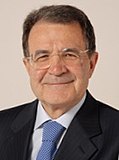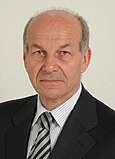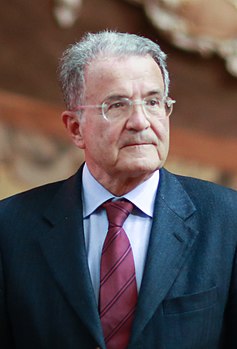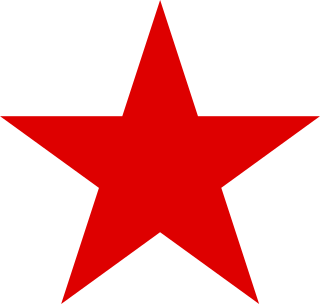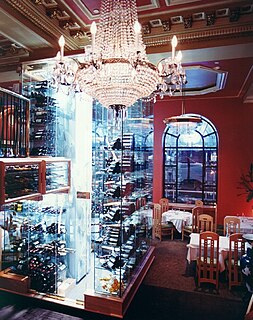
The Olive Tree was a denomination used for several successive centre-left political and electoral alliances of Italian political parties from 1995 to 2007.

The 2006 Italian general election for the two Chambers of the Italian Parliament was held on 9 and 10 April 2006. Romano Prodi, leader of the centre-left coalition The Union, narrowly defeated the incumbent Prime Minister Silvio Berlusconi, leader of the centre-right coalition House of Freedoms.

A snap national general election was held in Italy on 21 April 1996 to elect members of the Chamber of Deputies and the Senate of the Republic. Romano Prodi, leader of the centre-left coalition The Olive Tree, won the election, narrowly defeating Silvio Berlusconi, who led the Pole for Freedoms centre-right coalition.

The Prodi II Cabinet was the cabinet of the government of Italy from 17 May 2006 to 8 May 2008, a total of 722 days, or 1 year, 11 months and 21 days. The 59th cabinet of the Italian Republic, it was the only cabinet of the XV Legislature.

The Berlusconi III Cabinet was the cabinet of the government of Italy from 23 April 2005 to 17 May 2006. It was the 58th cabinet of the Italian Republic, and the second cabinet of the XIV Legislature.
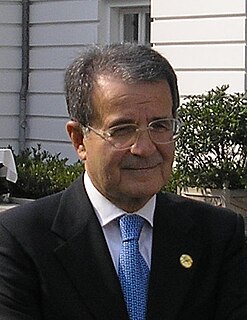
On 24 January 2008 Prime Minister of Italy Romano Prodi lost a vote of confidence in the Senate by a vote of 161 to 156 votes, causing the downfall of his government. Prodi's resignation led President Giorgio Napolitano to request the president of the Senate, Franco Marini, to assess the possibility to form a caretaker government. The other possibility would have been to call for early elections immediately. Marini acknowledged impossibility to form an interim government due to the unavailability of the centre-right parties, and early elections were scheduled for 13 April and 14 April 2008.

A snap general election was held in Italy on 13–14 April 2008. The election came after President Giorgio Napolitano dissolved Parliament on 6 February 2008, following the defeat of the government of Prime Minister Romano Prodi in a January 2008 Senate vote of confidence and the unsuccessful tentative appointment of Franco Marini with the aim to change the current electoral law. Under Italian law, elections must be held within 70 days of the dissolution. The voting determined the leader of Italy's 62nd government since the end of World War II. The coalition led by ex-Prime Minister Silvio Berlusconi from The People of Freedom party defeated that of former Mayor of Rome, Walter Veltroni of the Democratic Party.
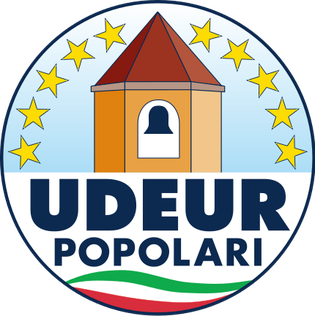
The Union of Democrats for Europe, also known as UDEUR Populars, was a minor centrist and Christian-democratic political party in Italy.
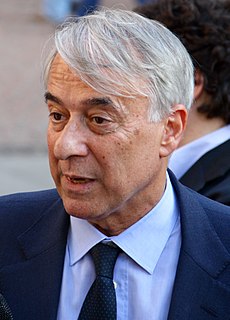
Giuliano Pisapia is an Italian lawyer and politician, twice member of the Parliament and former Mayor of Milan. As a politician, he has been a member of two left-wings parties, first Proletarian Democracy and then the Communist Refoundation Party; in Milan's mayoral election, he was endorsed by a large left-wing coalition, after winning the primary election of the Centre-left with the strong support of Nichi Vendola's Left Ecology Freedom. As a lawyer, he participated in a number of notable trials with political implications, including that of PKK leader Abdullah Öcalan and the trial that followed the death of anti-global activist Carlo Giuliani, shot by the police during the 27th G8 summit.
The 2006 Italian general election was the first in the country's history in which Italian and dual citizens living outside the country could vote by postal ballot in international electoral districts. Twelve members of the Italian Chamber of Deputies and six members of the Italian Senate were elected in this way.
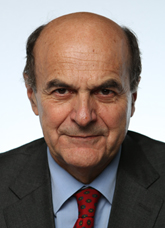
The 2012 Italian centre-left primary election determined the leader of the coalition Italy. Common Good, who will stand as common candidate for the office of Prime Minister in the subsequent general election, which will take place on 24–25 February 2013. It was won with 61% of the votes by Pier Luigi Bersani, who defeated Matteo Renzi in the run-off.

Indirect presidential elections were held in Italy between 18 and 20 April 2013. The result was the re-election of Giorgio Napolitano, the first time a President had been elected for a second term.

Ivan Scalfarotto is an Italian politician and activist, committed to LGBT rights. He was nominated to the national leadership of the center-left in the primary elections of The Union in 2005 and since 2009 is the vice president of the Democratic Party. He has been elected in the Chamber of Deputies after the 2013 general election.

The Communist Refoundation Party is a communist political party in Italy, emerged from a split of the Italian Communist Party (PCI) in 1991. The party's secretary is Maurizio Acerbo, who replaced Paolo Ferrero in 2017. Armando Cossutta was the party's founder, while Fausto Bertinotti its longest-serving leader (1994–2008). The latter transformed the PRC from a traditional communist party into a collector of radical social movements.
The centre-left coalition is a political alliance of political parties in Italy active, under several forms and names, since 1995 when The Olive Tree was formed under the leadership of Romano Prodi. The centre-left coalition ruled the country for more than twelve years between 1996 and 2018.



